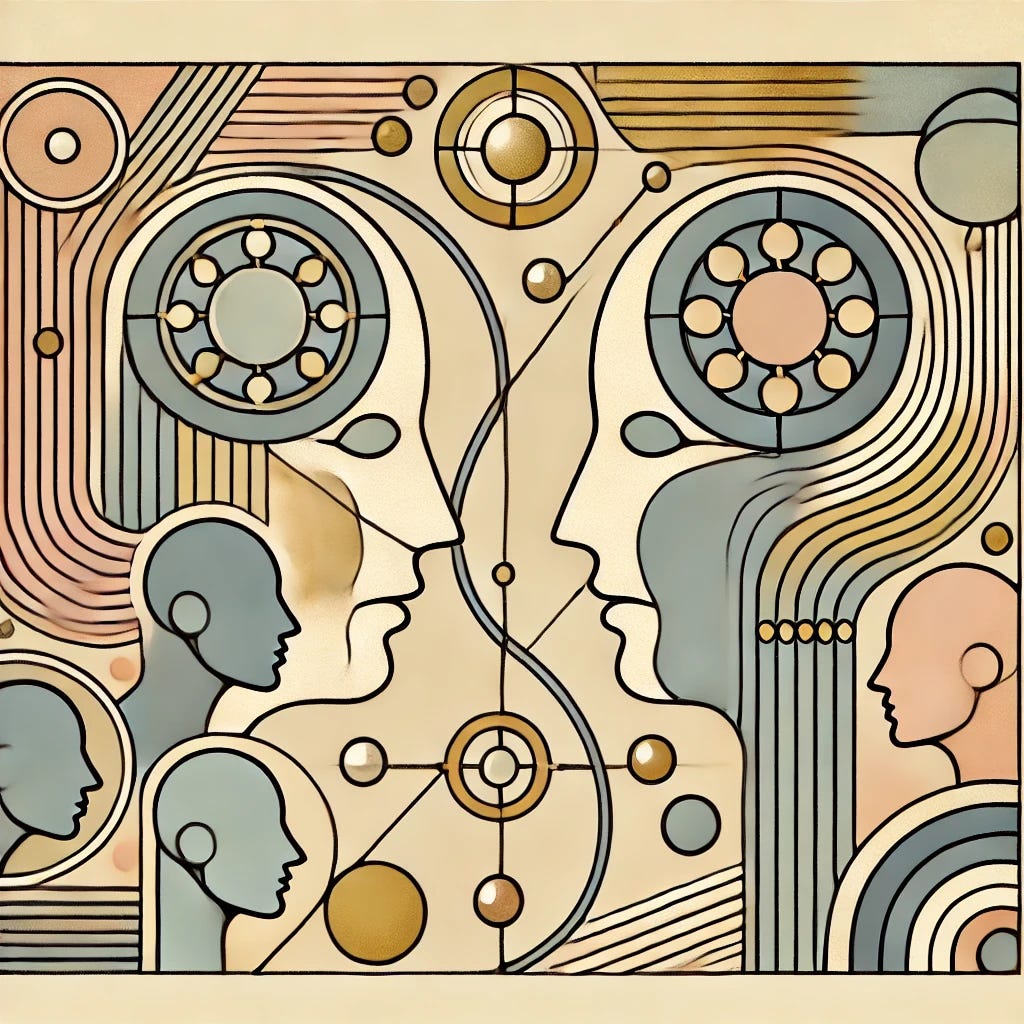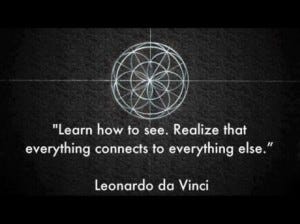Boundaries Tell People Who We Want To Be, Consequences Show What We're Willing to Do to Support It
“Give me some space.” The request starts small and can quickly escalate, burdened as it is with the emotional weight of feeling trapped, harried, and closed in. At any given time in our lives, many of us have uttered the phrase, or wanted to, or heard it from another. Often, though not always, the accompanying response was filled with its own share of hurt feelings, remorse for projected wrongdoing, and concern over what it meant for the relationship in question. The desire within the request and the emotional responses tied to it are all predicated on the belief that walls are coming up and boundaries are being established.
When working with others, often the declaration of “I’m terrible at boundaries” gets uttered. My response is typically to inquire as to an example, with the result being how the actions of another are felt to be a violation of some rule or desire by them within the relationship, followed by very little response or, at most, a simple verbalized protest. When this happens I will then point out that boundaries aren’t really the issue. The real problem is a lack of commitment to consequences.
Social boundaries are about expectations, but we often conflate them with obligations, as if the mere desire of us to be treated a particular way is and must be a demand that the person unequivocally accept and acquiesce to. The reality is far from being that simple, not least because of the inherent ethical issues involved in having individual desires become dictates upon another’s freedom of expression.
I can hear the protests already, centered on a declaration that boundaries are about safety, but that’s just it; boundaries don’t make you safe; supporting and following through with consequences do. These boundary lines are a means of delineating between “I” and “you” and socially between “us” and them,” and are often felt as uncrossable, as if the verbalization of a desire is a magic spell that defines reality for all concerned.
Fortunately, the natural order doesn’t care about the desires of the individual, nor does it respond to the prognostications of our inner world. Our ‘lived experience’ is not a declaration of how things actually are but only a report of our interpretation of limited data in the form of opinion. The real boundary crossing going on in much of our relationships is that of the inner world or our ‘authentic self’ crossing over to say to the world: the (my) mind is all that matters! As Francis Fukuyama states in his book “Identity”:
“In the old society, their limited social choices determined who they were on the inside; with new horizons opening up, the question “Who am I?” suddenly became more relevant, as did perceptions of a vast gulf that existed between the inner person and external reality. Ideas shaped the material world, and the material world created conditions for the spread of certain ideas.”
Boundaries Are An Extension of Ego
Boundaries in relationships of any kind are an extension of desire, a projection of worldview, or how we would like things to be. This is why boundaries are so easy to focus on: they begin and end with us as ripples shaping the sea of our consciousness. Consequences and the recognition that a so-called external world exists that is not necessarily subject to our whims and desires is a harder thing to deal with, and, like all things difficult, our human brains tend to shy away from it to what is simpler and more manageable.
To help with understanding, consider our bodies as providing an initial attempt at setting boundaries. One of the initial developmental stages is a recognition between infant and caregiver, in which we begin to think of the world and everything in it as being “out there” and our self as being “within” the skin. This is a needed separation for biologically relating to other objects, as we’d certainly have a hard time talking with others or even tying our shoes if we didn’t have a means of differentiating self from other. However, if we focus too hard on that seeming separation, of seeing the world and people as ‘other,’ this preoccupation with the self can result in unnecessary hurt and misunderstanding later in life as we falsely believe our own mind/identity/experience is all that matters.
Boundaries Are Not Walls
By separating too much the inner world of experience from a recognition of our embeddedness in the many layers of reality, we can wrongly start seeing boundaries as walls, as instantiations of impregnability. Walls as high as the sky and thick as steel, only letting things in that we want, where we are only being affected by what we choose to let affect us. We start to believe that the world, as ‘out there,’ is something we can choose to interact with. And since people are in that world, then they become an influence by choice as well.
This leads to us being surprised when we continue to be hurt by memories inspired by sights and smells. We make statements like “I shouldn’t let it affect me” where it concerns the actions of others, or hear from someone that they can’t “make us” feel hurt when they’ve done something awful. Suddenly the walls are no longer nearly as impregnable as we thought, that our separate existence isn’t nearly as isolated as we believe, and, unfortunately, rather than questioning the assumptions we carried about the nature of relationships and our self, we instead blame ourselves for not having good boundaries. We cast ourselves upon the altar of a false belief concerning our autonomy and think there’s something wrong with our inner world.
Boundaries Are Like Sponges
Perhaps instead of walls separating us from other people and reality as a whole, boundaries can be considered instead more like sponges. There’s only so much that a sponge, like the skin, can take in before it hits a saturation point. It absorbs because it isn’t separate from the world, but instead relates to and within it because of its nature. Once the saturation point has been reached, something must change.
Notice here the phrase “take in.” It’s very deliberate. Just as a sponge becomes heavier when soaking up water, so it is taking on as part of its existence what it absorbs. This is similar to empathy, in that we are constantly relating with others and as such the contents of what we work with are changing. We don’t turn empathy off, anymore than someone is an empath and others aren’t. Our lives are lived in a constant environment of relationships, taking on and exhibiting some of the properties that the relational space brings. We can no more separate ourselves from the world than we can declare that a particular situation will only have the effect on us that we choose.
As our boundaries shift in different environments, and we absorb different experiences, so we also reach a point of overwhelm. Even the most extroverted of people will eventually become overwhelmed by too many people over a certain amount of time. Bingeing on sweets eventually leads to stomach pain. Everything has the potential to overwhelm how we see ourselves and what we’re able to deal with. We take in only so much before something has to change. Training helps, hence why star athletes can do more than the average person. There’s also tolerance, both in working through trauma responses with gradual exposure and, negatively, drug use, where tolerance leads to needing more to get a similar response.
Consequences Matter
Seeing boundaries as sponges, and removing the assumption that we exist as autonomous separate individuals in utter control over what will and will not effect us, points to why consequences are so important. Consequences are a declaration through our behavior of our limits, of what we believe ourselves willing and able to deal with before crossing a line of harm. Consequences, both as statements of what will happen, and follow through by our actions, are an expression of the sanctity of our own person. They’re a recognition that because we live interconnected lives, we need to be aware of and, where possible, mitigate the effects of what influences us.
At the social level, boundaries are laws and consequences are restrictions on behavior through court order or other representative of the law. At the individual level, boundaries are defining and having discussions with others about the nature of whatever connection exists and how you’d like to be treated within it. The consequences are everything from a stated protest, to leaving, changing how often you are around the person, and, when physically assaulted, fighting back.
When finding yourself wondering whether your boundaries are strong, instead ask: “What behavior have I accepted as being part of my life?” and “If I don’t like it, what am I willing to do to change its presence in my life?”
We are all, every one of us, living in an inter-connected and therefore interwoven world, where the lines between “I” and “you,” “us” and “them” are almost entirely a matter of creation through labels, dialogue, and ethics. Our humanity starts with connection and gains individual form through what we create together. Our sponge-like boundaries may not feel as safe as the walls did, but the walls never existed anyway. Be clear about your boundaries, but know that there will come a point where consequences are what you’ll need to act on.



